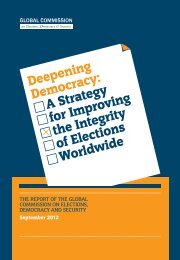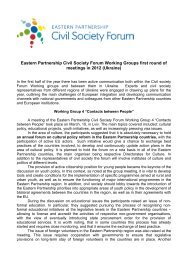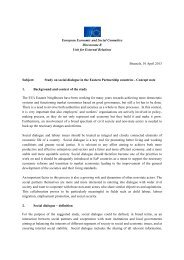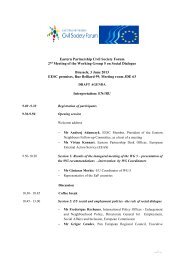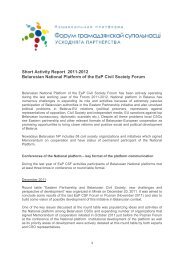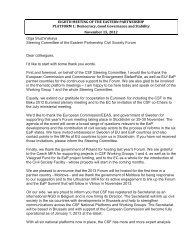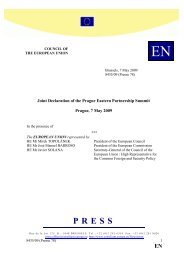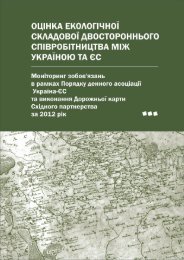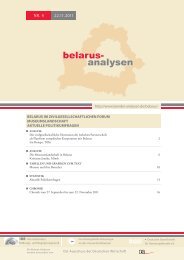Non-formal education - Eastern Partnership Civil Society Forum
Non-formal education - Eastern Partnership Civil Society Forum
Non-formal education - Eastern Partnership Civil Society Forum
You also want an ePaper? Increase the reach of your titles
YUMPU automatically turns print PDFs into web optimized ePapers that Google loves.
Unfortunately, non-<strong>formal</strong> <strong>education</strong> is not reflected in a recent strategic-operational document of<br />
the Ministry of Education of the Republic of Moldova – draft Strategy of sectorial development “Education<br />
2020” 46 .<br />
Our study showed that the more widely the term ‘non-<strong>formal</strong> <strong>education</strong> “is used in the documents<br />
that define policies and strategies for youth in the Republic of Moldova.<br />
The National Strategy on Youth for 2009-2013 states that non-<strong>formal</strong> <strong>education</strong> involves required for<br />
each young person a comprehensive social experience, the use of free time for <strong>education</strong>al purposes,<br />
provides the opportunity to gain experience by voluntarily individual or collective participation, developing<br />
skills of healthy lifestyles and preparing young people to become active citizens 47 .<br />
According to this document “activities organized outside the school program or by non-governmental<br />
organizations and other institutions engaged in <strong>education</strong>al activities and personal development, are<br />
called non-<strong>formal</strong> <strong>education</strong> activities ... <strong>Non</strong>-<strong>formal</strong> <strong>education</strong> includes a range of activities carried out<br />
in the non-<strong>formal</strong> setting, outside of the <strong>education</strong>al system, but an organized, and is the link between<br />
the knowledge acquired in the classroom, and information obtained in the non-<strong>formal</strong> setting.”<br />
The legislation governing the feasibility of non-<strong>formal</strong> <strong>education</strong> reflects the above mentioned<br />
mechanism of development of non-<strong>formal</strong> <strong>education</strong> in the Republic of Moldova – after school, additional,<br />
extracurricular <strong>education</strong> of children and youth, the activities of non-governmental organizations on<br />
civic <strong>education</strong>, democracy, human rights, etc.; organizations of adult <strong>education</strong>:<br />
a) The Ministry of Education (supplementary, additional, extracurricular <strong>education</strong> of children and<br />
young people):<br />
– Law on Education, 1995, 34-35<br />
– The concept of the development of <strong>education</strong> in the Republic of Moldova<br />
- The concept of non-<strong>formal</strong> <strong>education</strong>, 2003<br />
– National Strategy and Action Plan ‘Education for All’, 2004<br />
– Memorandum of the Commission of European Council on lifelong learning, 2000<br />
b) Social organizations (civic <strong>education</strong>, human rights, etc.)<br />
– Law on the rights of children № .338-XIII, 1994.<br />
– Law on Youth # 279-XIV, 1999<br />
– National Strategy on Youth for 2009-2013, approved by Law # 25 from 03.02.2009<br />
– Strategy for the Development of <strong>Civil</strong> <strong>Society</strong> 2012-2015, adopted by the Parliament of the<br />
Republic of Moldova, September 27, 2012<br />
– National Strategy of the Republic of Moldova 2012-2020<br />
The Government of the Republic of Moldova has ratified a number of international policies and<br />
recommendations on health, development, protection and participation of children and young people to<br />
increase access of young people to the services of non-<strong>formal</strong> <strong>education</strong>:<br />
– UN Convention on the Rights of the Child, ratified in 1990<br />
– Resolution of the International Conference on Population and Development, 1994<br />
– Millennium Development Goals, UN, 2001<br />
– Declaration of a Special Session of the UN General Assembly (SSAGONU) for Child (LBS)<br />
– Declaration of a Special Session of the UN General Assembly on HIV / AIDS<br />
– Council of Europe Recommendation on the development and recognition of non-<strong>formal</strong><br />
<strong>education</strong> of children and youth, 2003<br />
c) Organizations of adult <strong>education</strong> (continuing professional <strong>education</strong>, development of human<br />
resources)<br />
1. International conventions ratified by the Republic of Moldova:<br />
– ILO Convention on vocational guidance and training in the field of human resource development<br />
from 19. 07. 1977<br />
46<br />
http://particip.gov.md/public/documente/137/ro_427_Proiectul-Strategiei-Sectoriale-de-Dezvoltare-Educatia-2020.pdf<br />
47<br />
Национальная стратегия по делам молодежи на 2009–2013 , утв. Законом №. 25 от 03.02.2009<br />
66




